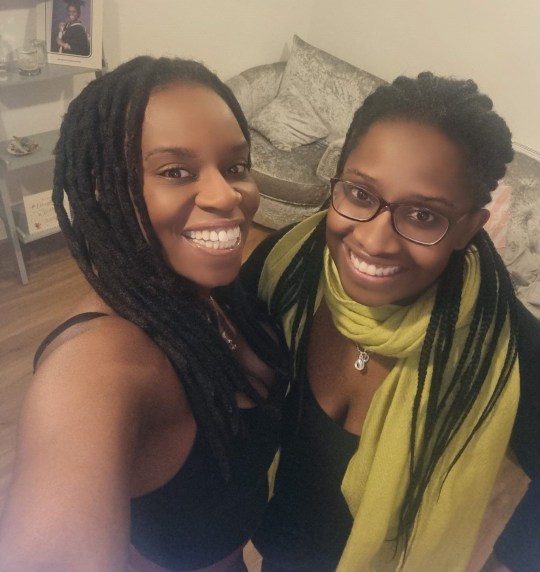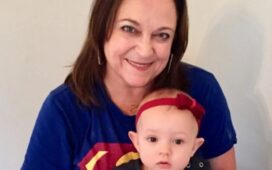As the school bus hurtled down to Wembley to take my primary school classmates and I to watch England play in a friendly, there was a real buzz.
We sang songs, shared fizzy sweets, fed our Tamagotchis and enjoyed the excitement.
Then a teacher stumbled down the coach aisle to carefully face-paint a red St George’s cross on every child who wanted one.
Red cross, move on. Red cross, move on.
However, when she reached me, she stopped and asked me a question so quietly I missed it. She leaned in closer and asked, clear as day this time, ‘Are you English, Kim?’
My face grew hot like she was shining a lamp over it. I felt everyone looking at me and I wanted to get off the coach and hide.
Instead, I nodded, yes. My teacher smiled back, and I swiftly received my red cross. Although it may as well have been a red stamp reading: APPROVED.
I think this was one of the first instances where I learned that despite being born and raised in the same place as my friends, people would always see me as ‘other’.
There would always be a question around me as a Black child in the predominantly white area of Romford, Essex.
Most of the time, my childhood in the late nineties was a happy one with plenty of friends.
Ethnicity and culture didn’t really come into my friendships then. At the very most, it meant I was usually cast as Mel B in our Spice Girls dance routines, but as she was my favourite spice girl (Girl Power forever!) that wasn’t a problem.
As we skulked into adolescence, dance routines were replaced with hair and make-up. We suddenly became increasingly aware of how we looked and – I suppose – how I didn’t look.
My friends began to ask questions about my hair, ‘why does it grow out?’ or ‘why don’t you wear a ponytail like mine?’ Of course, they were questions that were meant innocently, but they just made me aware of how different I really was.
I tried to respond as well as I could, but there were things I simply didn’t know how to answer. I hated that feeling, like I didn’t understand that part of myself.
Hair was a big, tangly thing for me. For a long time, it felt like another thing that separated me from my non-Black friends.
When everyone was straightening the life out of their hair in the 2000s, I began relaxing mine (a popular process used to straighten tightly curled, mostly Afro, hair) even though I could see the chemicals in the required creams and lotions damaging it.
I think I thought it would help me fit in and stop all the awkward questions.
Even though this is a somewhat sad part of my story, it’s something I feel I had to go through.
I experimented with lots of different styles through my hair journey: blue braids, purple braids, cornrows, beads, afro puffs, quiffs (yikes!) and just a big old ‘fro. While my school allowed me to wear my hair how I chose to, I feel there was generally a negative outlook around Afro hair.
Surveys in the Hair Equality Report from 2019 found that one in six parents said that their children have experienced negative experiences based on their hair. Of these, 46% said that their children’s school policy penalised Afro hair.
I, too, experienced negativity when I once asked a teacher for help putting my swim cap on before swimming lessons. She looked at me, then at my braids and moaned that I was being ‘so difficult’.
Children were giggling all around me as I stood in my swimming costume, with my cap in hand trying not to cry. Whether she knew it or not, the teacher had told me – and everyone in earshot – that Blackness was an inconvenient problem she just didn’t have time for.
Once I left school, I started to untangle my relationship with my hair and began to love it in its natural form. I made more Black friends and felt inspired to try different things with it.
I eventually stopped relaxing it and started to relax in my own skin. But it’s a shame I had to wait until I left school to find acceptance.
That’s why, when I became a children’s writer, I wrote a book called Me And My Hair, which is all about the beauty of Afro hair.
My aim was to show off a variety of Black hairstyles – braids and dreadlocks, cornrows and Afro puffs – and help readers understand how to care for Afro hair.
I also wanted to highlight how important it is for people to be able to wear Afro hair however they choose. Afro hair, and all hair types, may be a part of people’s identity, so we should respect each other and celebrate our differences.
My book is essentially a love letter to every child who doesn’t quite understand every part of themselves yet, too.
Today, I have two young daughters with beautiful Afro hair. They have a more diverse group of friends than I did, which I think has given them a better understanding of identity.
They’re already asking me for every Afro hairstyle YouTube has to offer. I’m sure they’ll encounter their own battle at some point in life – whether it be an ignorant schoolteacher or sarcastic swimming teacher – there will be something.
It’s my job as a mother to show my daughters that no matter how they wear their hair, they will always be accepted, and they will always belong.
They are not ‘other’ like I once felt.
Do you have a story you’d like to share? Get in touch by emailing James.Besanvalle@metro.co.uk.
Share your views in the comments below.
MORE : People called me ‘poodle’ because of my afro — Mel B is right to see it as racism
MORE : I told a colleague I had breast cancer and he laughed
Sign up to our guide to what’s on in London, trusted reviews, brilliant offers and competitions. London’s best bits in your inbox
This site is protected by reCAPTCHA and the Google Privacy Policy and Terms of Service apply.



















